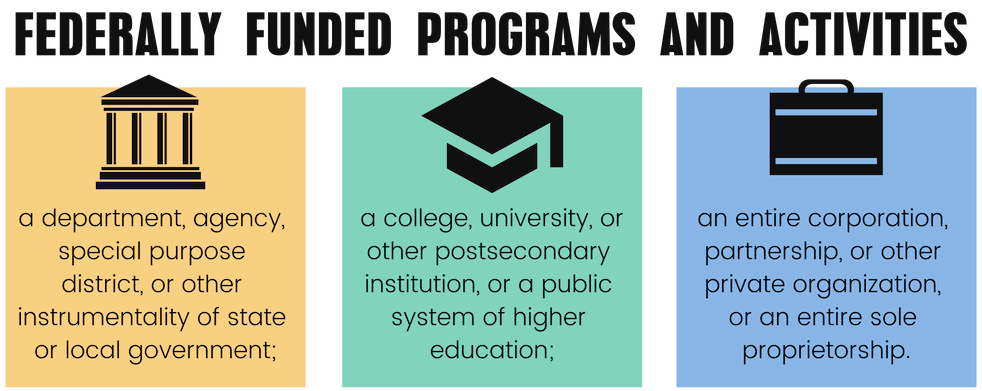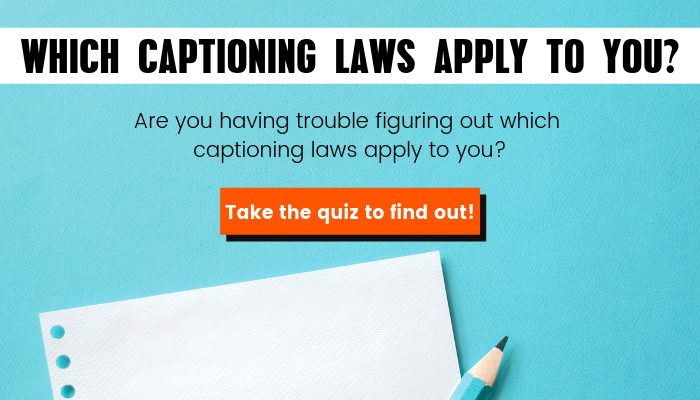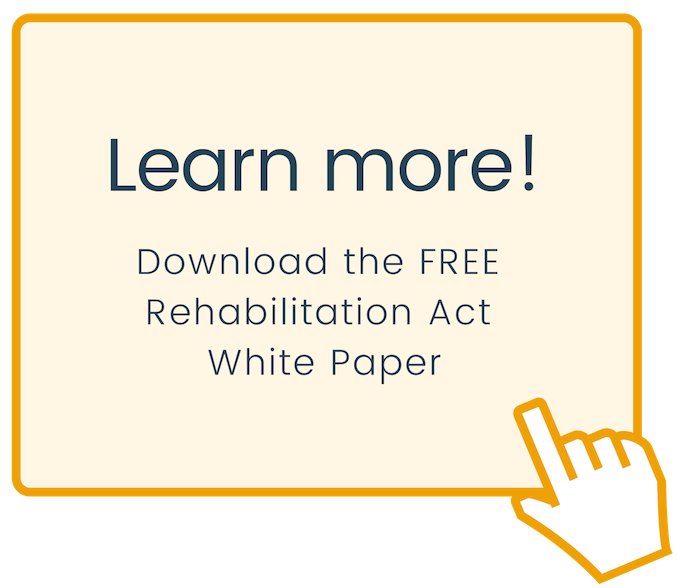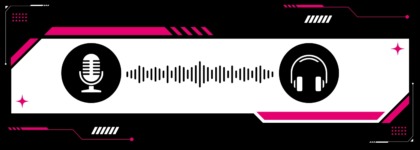Accessibility Laws for Federally Funded Programs
Updated: September 6, 2023
If there’s one thing that we know for sure about accessibility law, it’s that it isn’t black and white. Factors such as the type of organization, the funding it receives, and the products or services it makes available all determine which accessibility laws come into play. For federally funded programs, clarity of accessibility laws can be murky at best.
Discover which accessibility laws apply to federally funded programs and learn how to stay compliant.
What are Federally Funded Programs?
Before delving into which accessibility laws apply to federally funded programs, let’s first define federally funded programs.

On the other hand, an organization may not be a federal agency but may still receive federal funding. In this case, the organization is still considered a federally funded program. For example, most private colleges and universities, such as Harvard University receive federal grants or financial aid for its students. The use of federal funding classifies Harvard University as a federally funded program and makes it subject to any laws applying to federally funded programs.
What else is classified as a federally funded program? The official definition describes it as a program or activity “receiving Federal financial assistance.” As defined by Section 504 of the Rehabilitation Act, a program or activity refers to all of the operations of a public system of higher education, a private organization, and an instrumentality of a State or local government, among other things.

Which Accessibility Laws Apply to Federally Funded Programs?
Now that we’ve covered the “what” of federally funded programs, it’s time to discuss which accessibility laws apply to them and how.
The Rehabilitation Act
Enacted in 1973, the Rehabilitation Act is a federal anti-discrimination law that affects federal and federally funded programs in their treatment of individuals with disabilities. Initially, the Rehabilitation Act focused on equal employment practices, reasonable accommodations, and federally subsidized programming for people with disabilities. After over 40 years of being enacted, interpretations of the Rehabilitation Act are changing due to the emergence and development of the internet.
Section 504 and Federally Funded Programs
Within the Rehabilitation Act, Section 504 gives individuals with disabilities the same rights as groups protected by the Civil Rights Act of 1964. It applies to federal programs or agencies and programs receiving federal funding like public libraries and universities, while also extending to local educational agencies such as K-12 schools. Per legal requirement, any covered entity must make itself accessible, including providing captioned videos for deaf or hard of hearing individuals.
Section 504 explicitly indicates the following:
No otherwise qualified individual with a disability in the United States […] shall […] be denied the benefits of, or be subjected to discrimination under any program […] receiving Federal financial assistance or any program or activity conducted by any Executive agency.
This means that everyone must be able to fully participate in federal agencies or federally funded programs covered under Section 504 of the Rehabilitation Act, either as an employee or member or the public, regardless of any physical or intellectual disability. Even if an organization is not covered under Section 504, it is important to have an understanding of the Americans with Disabilities Act (ADA), which may apply. The ADA is essentially an expansion of 504 to the public sector which protects a broader range of people with disabilities.
Section 508 and Federally Funded Programs
Section 508 of the Rehabilitation Act covers federal programs or agencies and their use of electronic and information technology. Electronic information provided by these entities must be accessible in many ways so that is doesn’t rely solely on any single sense or ability of users. This law ensures that information is available to those with disabilities.
Web content accessibility is a specific requirement under Section 508, and the recent refresh directly references the Web Content Accessibility Guidelines, known as WCAG 2.0, which specifies levels of compliance. Federal programs are legally required to comply with WCAG 2.0 AA standards, which includes captioning and audio description requirements.
Section 508 does not specifically apply to federally funded programs, though it often extends to them through other laws and through state policies. For example, the U.S. government may withhold state funding if the state doesn’t comply with Section 508. The Assistive Technology Act won’t provide funding for states unless they guarantee all state programs, like universities, will comply with Section 508. In addition, many states have enacted their own laws – called “little 508s” – which cover any state funded programs.
Getting Sued for Noncompliance
The litigation landscape is changing in regards to web accessibility. The ADA, which has no specific web accessibility guidelines, is increasingly being used to enforce website accessibility. Even with the ADA remaining unclear, it’s estimated that nearly 1,500 cases will be brought forward under the ADA before the end of 2018.
For laws like Section 504 and 508 which explicitly lay out web accessibility guidelines, legislation is far less likely to be up for interpretation, making it crucial that federal agencies and federally funded programs fully understand and adhere to the law.
NAD v. MIT and Harvard University
It’s important to understand that the ADA, the Rehabilitation Act, Section 504, and Section 508 are not mutually exclusive. It may be the case that each one of these laws apply to a single organization, and it’s the responsibility of that organization to ensure continuous compliance. It is entirely possible that a federally funded program be sued under Section 504 for not providing captioning, while simultaneously being sued under Section 508 which is applicable to that organization through the Assistive Technology Act.
In 2015, the National Association of the Deaf (NAD) filed a federal lawsuit against Massachusetts Institute of Technology (MIT) and Harvard University, both of which failed to provide accurate and comprehensive captions for their course material. The actions and noncompliance on the universities’ part violated the ADA and the Rehabilitation Act, therefore the class action lawsuit brought forward by the NAD cited violations of both laws. These universities were clearly not immune from being sued under multiple accessibility laws at once.
Ken Nakata, who is the Director of Accessibility Consulting at Cyxtera Technologies, drives this point home. He says, “you still can easily get sued by another person” even if you’re currently involved in another accessibility lawsuit and regardless of whether you’re working towards accessibility.
Understanding what federally funded programs are, knowing which laws apply to them, and making an honest effort to stay compliant is key for these programs to serve the community well and avoid potential lawsuits.

Further Reading

Subscribe to the Blog Digest
Sign up to receive our blog digest and other information on this topic. You can unsubscribe anytime.
By subscribing you agree to our privacy policy.







